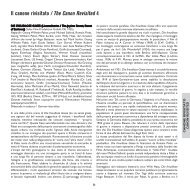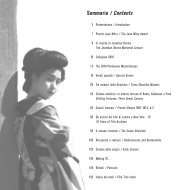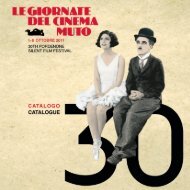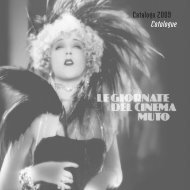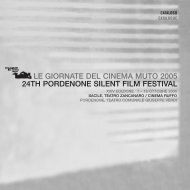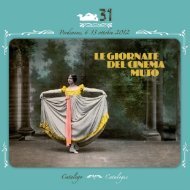Catalogo Giornate del Cinema Muto 2012 - La Cineteca del Friuli
Catalogo Giornate del Cinema Muto 2012 - La Cineteca del Friuli
Catalogo Giornate del Cinema Muto 2012 - La Cineteca del Friuli
You also want an ePaper? Increase the reach of your titles
YUMPU automatically turns print PDFs into web optimized ePapers that Google loves.
Anna Sten in Provokator, Viktor Turin, 1928.<br />
per quanto riguardava il copione: una storia importante dal punto<br />
di vista “psicologico”, che descrive la trasformazione <strong>del</strong>lo studente<br />
rivoluzionario in inforamtore <strong>del</strong>la polizia con una ricostruzione<br />
originale e rispettosa dei “dettagli d’epoca”. Si mostrò tuttavia molto<br />
scettico nei confronti <strong>del</strong>la regia di Turin che, a suo dire, si inseriva<br />
nella tradizione <strong>del</strong> “dramma psicologico alla tedesca” (immaginiamo<br />
che uno dei motivi <strong>del</strong> rimprovero fosse in primis la scena <strong>del</strong>la prigione<br />
in cui lo studente Viktor è ossessionato dalla visione di se stesso –<br />
come è ora, come sarà da forzato e poi da vecchio ergastolano – tre<br />
immagini che appaiono in split screen e che lo spaventano al punto di<br />
accettare la collaborazione con la polizia).<br />
È tuttavia interessante notare come i due critici, pur non mostrandosi<br />
molto soddisfatti <strong>del</strong>la recitazione, elogino entrambi Anna Sten.<br />
L’autore <strong>del</strong>l’articolo di Zhizn iskusstva scrive: “Nonostante ciò, Anna<br />
Sten è magnifica. Riesce a creare un’immagine straordinaria, dolce e<br />
toccante nel piccolo ruolo <strong>del</strong>la studentessa, a quanto pare, il suo<br />
primo ruolo cinematografico”. Il severo critico di Kino si spinge<br />
oltre: “Gli attori di questo film sono molto diversi, dal rispettabile<br />
Panov all’eterno mascalzone Koutouzov, e infine Anna Sten, che<br />
è giovanissima, ma già molto divertente e accattivante nelle sue<br />
movenze. Ma questa attrice è solo una piccola macchia brillante,<br />
72<br />
che si perde sullo sfondo grigio <strong>del</strong><br />
film. Ecco perché il calcolo fatto dai<br />
distributori <strong>del</strong> VUFKU – lanciare un<br />
vecchio film sfruttando il nome oggi<br />
molto popolare <strong>del</strong>la Sten – non pare<br />
molto fondato.”<br />
Così la prima particina <strong>del</strong>la giovane<br />
debuttante Anna Sten diventa un<br />
atout <strong>del</strong>la Sten diva per richiamare<br />
gli spettatori russi alla première di<br />
un film ucraino diretto da un regista<br />
sovietico formatosi a Hollywood e<br />
realizzato imitando i film tedeschi.<br />
NATALIA NUSSINOVA<br />
The student Lipa in Agent provocateur<br />
seems to have been Anna<br />
Sten’s first role in the cinema. It was<br />
probably in 1926 that Viktor Turin<br />
offered to the very pretty beginner<br />
the part of a character who seems<br />
marginal to the story, and does<br />
not even figure in the synopsis of<br />
the film that he had been shooting<br />
since 1923. Lipa, the girlfriend of<br />
the revolutionary terrorist, is a little<br />
student, a young girl from a good,<br />
honest but not rich family, a <strong>del</strong>icate<br />
young lady in the old style, who<br />
blushes and faints, and whose character bears the surname Khromova,<br />
like the heroines played by Vera Kholodnaya and Lidia Koreneva, rival<br />
sisters in the famous melodrama Zhizn’ za Zhizn’ (A Life for a Life).<br />
Bauer’s 1916 masterpiece could surely not have been unknown in the<br />
VUFKU studios, established in the Ukraine in 1922 on the basis of the<br />
old pre-revolutionary studios of Khanzhonkov, Ermoliev, Kharitonov,<br />
etc., and giving shelter to such directors from the Tsarist cinema as<br />
Vladimir Gardin and subsequently Piotr Tchardynin.<br />
But the marginal character played by Sten comes out of the shadows<br />
to assume an important place in the structure of the film. The police<br />
arrest the girl, using blackmail, aggression, and even money to try to<br />
make her become an agent provocatrice. Fragile though she seems,<br />
she nevertheless finds the strength to refuse, and it is thus that she<br />
becomes the antithesis of the agent provocateur Viktor, the main<br />
hero, a student from a well-off family, inspired by the romantic and<br />
clandestine, who readily cracks under police pressure and becomes<br />
a traitor and informer, resulting in the death of his friends. It is in<br />
this counterpoint of characters that Sten found the opportunity<br />
to show the evolution of her heroine, who passes from timidity to<br />
extreme courage, to the point of throwing an inkwell in the face of<br />
the policeman and threatening him with a pistol. And of course her<br />
courage costs her dear: three days later the newspapers tell us that the<br />
body of Miss Khromova has been fished out of the river. The official<br />
explanation of the “suicide” is quite in keeping with the traditions of<br />
Russian melodrama of the 1910s – a case of unhappy love.<br />
Work on the film lasted 4 years, owing to conflicts between the<br />
director and the management of VUFKU studios. For Viktor Turin<br />
(1895-1945) this marked his debut as a director, following his return<br />
to the USSR; he had lived in the United States (1912-22), been<br />
educated at M.I.T. (Massachusetts Institute of Technology), and had<br />
worked in Hollywood as an actor and synopsis writer. But he took<br />
the liberty of criticizing the scenario by Oles’ Dosvitnyi (Aleksandr<br />
Skripal-Mischenko, 1891-1934), a Ukrainian writer who was editor-inchief<br />
at VUFKU and one of the founders of the Yalta studios where<br />
the film was made. Turin blamed the scenario for many ideological<br />
errors, but the VUFKU bosses insisted on the production. Turin<br />
<strong>del</strong>ayed the shooting on the pretext that the facilities given him were<br />
unsatisfactory. Accused in his turn of ideological errors, he called for<br />
a control commission at which he offered his justification. But finally,<br />
just as the film was finished, the presidential council of VUFKU was<br />
renewed, and the new heads criticized him, demanding re-editing<br />
involving serious cuts which affected the very heart of the story.<br />
For Turin this was not very worrying, because he had meanwhile made<br />
another film, Struggle of Giants (1926), also for VUFKU, and then<br />
acheived fame thanks to the documentary Turksib (1929), with its<br />
scenario by Yakov Aron and Viktor Shklovsky.<br />
But Dosvitnyi’s ending was to be much different. The Party Congress<br />
on <strong>Cinema</strong> in March 1928 accused the heads of VUFKU of nostalgia<br />
for Tsarist cinema and of having employed “old reactionary directors”.<br />
As a result of the purges that followed, Dosvitnyi lost his post as<br />
chief editor at VUFKU in 1929; four years later he was accused of<br />
counterrevolutionary activity, arrested, and shot.<br />
Since the distribution of Ukrainian films in the USSR took time, Agent<br />
provocateur was not released in Russia until October 1928, when<br />
it provoked very opposing reviews. The Moscow newspaper Kino<br />
reproached this “screen novelty” for being banal, old-fashioned, and<br />
naïve, and using the images to illustrate the intertitles. Kino’s critic<br />
went on to complain of the uninteresting interiors: “It is very badly<br />
staged, and so badly lit that it takes some effort to recognize the actors<br />
at the start of every shot.” The critic of the revue Zhizn Iskusstva was<br />
much more tolerant, especially with regard to the scenario – in his<br />
view, it was an important story from the “psychological” viewpoint,<br />
demonstrating the transformation of the revolutionary student<br />
into an agent provocateur for the police, with a precise and original<br />
representation of “details of the period”. However, he was more<br />
sceptical regarding Turin’s direction, which he considered reproduced<br />
the tradition of the “German psychological genre” (we can assume that<br />
the reason for this was the scene in the prison where the student Viktor<br />
is obsessed by visions of himself, as he is now, as a future prisoner, and<br />
as an old convict, all three images appearing in split-screen and making<br />
him so fearful that he agrees to collaborate with the police).<br />
73<br />
It is notable that though neither critic is very satisfied with the acting,<br />
both appreciate Anna Sten. The author of the article in Zhizn Iskusstva<br />
writes: “And yet Anna Sten is magnificent. She has succeeded in<br />
creating a remarkable image, sweet and touching, for the quite small<br />
role as the student, which is, it appears, the first part she has played.”<br />
The severe critic of Kino goes even further: “The actors in the film<br />
are very different; here is the respectable Panov, the eternal scoundrel<br />
Kutuzov, and finally Anna Sten, who is very young, but already very<br />
amusing and piquant in her movements. But this actress is only one<br />
very small bright spot, lost in the gray background of the film. … This<br />
is why the calculation of VUFKU’s distributors, to launch an old film<br />
taking advantage of the name of Sten, which is now in vogue, has little<br />
chance of succeeding.”<br />
Thus it was that the first small role of the young novice Anna Sten,<br />
making her film debut, became a trump card for Sten the Star, which<br />
was to attract Russian spectators to the premiere of a Ukrainian film,<br />
made by a Soviet director formed in Hollywood and imitating German<br />
films. – NATALIA NUSSINOVA<br />
MOI SYN (Syn / Staroe derzhit) [Mio figlio / My Son; Son; The Old<br />
Keeps] (Sovkino, Leningrad, USSR 1928)<br />
Regia/dir: Yevgenii Cherviakov; scen: Aleksandr Macheret, Viktor<br />
Turin, Yuri Gromov, Yevgenii Cherviakov, dal racconto/from the<br />
story “Caso n. 3576”/“Case No. 3576” di/by Dmitrii Sverchkov; f./<br />
ph: Sviatoslav Beliayev; scg./des: Semion Meinkin; aiuto regia/asst. dir:<br />
Nikolai Dirin; asst: Mikhail Gavronskii, Pavel Morozov; cast: Anna<br />
Sten (Olga Surina), Gennadii Michurin (Andrei Surin), Piotr Beriozov<br />
(Trofim), Olga Trofimova (vicina grassa/fat neighbour), Yelena<br />
Volyntseva (vicina magra/skinny neighbour), N. Mikhailova (vecchia<br />
vicina/old neighbour), Ursula Krug (madre <strong>del</strong> bambino morto/mother<br />
of the dead child), Nadezhda Yermakovich (prostituta/prostitute),<br />
Nikolai Cherkasov (“Pat”), Boris Chirkov (“Patachon”), Piotr Beriozov<br />
(“Charlie Chaplin”), Yevgenii Cherviakov (ubriaco/drunk), Vladimir<br />
Stukachenko (capo commissione locale/Head of the local committee),<br />
Boris Feodosiev (comandante dei pompieri/Head of the fire brigade),<br />
Gleb Bushtuev, Piotr Kuznetsov, Sergei Yegorov-Bystrov (pompieri/<br />
firemen), Mark Cherviakov (bambino/child); data uscita/rel: 21.8.1928;<br />
orig. l. (35mm): 1900 m.; DVD (da/from 16mm), 49'; fonte copia/print<br />
source: Museo <strong>del</strong> Cine Pablo Ducrós Hicken, Buenos Aires.<br />
Didascalie in russo, con sottotitoli in inglese / Russian intertitles, with<br />
English subtitles.<br />
<strong>La</strong> riscoperta da parte di Fernando Martin Peña e Paula Félix-Didier<br />
nel Museo <strong>del</strong> Cine Pablo Ducrós Hicken di Buenos Aires (la stessa<br />
fonte <strong>del</strong> recente ritrovamento <strong>del</strong> Metropolis integrale) di 5 dei 7<br />
rulli di Moi syn di Yevgenii Cherviakov può essere considerata la più<br />
importante riapparizione in ambito sovietico <strong>del</strong>la seconda metà <strong>del</strong><br />
secolo scorso. Il film rappresenta uno dei rari casi in cui i testi di storia<br />
<strong>del</strong> cinema andrebbero riveduti, se non addirittura riscritti. Ma ciò<br />
richiederà probabilmente ancora molto tempo: i film di Cherviakov<br />
(1899-1942) sono stati completamente dimenticati, perfino nel suo<br />
ANNA STEN




